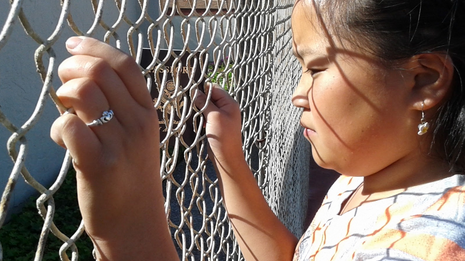An 11-year-old boy, a U.S. citizen, wrongfully detained for over a month.
A woman forcibly returned to her abusive husband’s control without her attorney’s knowledge.
The rampant spread of tuberculosis and pneumonia among small children.
These horrors may sound like scenes from a movie or news reports from a distant Third-World country, but the reality is that these injustices are occurring right here in the United States.
When a spike in violence caused an exodus of refugees from Central America last year, the United States government responded by resuming the previously condemned practice of using family detention centers and rapid deportation, creating what some have called a humanitarian disaster.
Last summer, the Department of Homeland Security (DHS) opened a temporary facility in Artesia, New Mexico where detainees (mostly single mothers and children) faced poor living conditions and a lack of legal representation in their immigration proceedings.
In an attempt to ensure a fair legal process for the immigrants, members of the American Immigration Lawyers Association (AILA) have created the Pro Bono Project and begun fundraising in order to provide families in the detention centers with free representation.
In September, AILA appealed to Congress and the Obama administration, urging them to “close Artesia and to abandon the strategy of detaining and rapidly deporting families.”
AILA’s letter to Congress stated, “Based on hundreds of interviews with these detained families that our expert lawyers have conducted, AILA has concluded that Artesia is a due process failure and a humanitarian disaster that cannot be fixed and must be closed immediately.”
AILA cited “the remoteness of the center and the lack of adequate and appropriate resources” as well as “the denial [without legal foundation] of many legitimate asylum claims” as obstacles interfering with effective representation and a fair legal process.
Although those held in Artesia were recently moved to a permanent center in Dilley, Texas in mid-December, the conditions in the new facility are not significantly better.
Director of Policy at the National Immigrant Justice Center Royce Bernstein Murray said, “Artesia was definitely family detention at its worst, but the Dilley center continues to have fundamental issues.”
Until the wave of immigrants from Central America last July, applicants seeking asylum in the United States who met a “credible fear” standard and proceeded through a “merits hearing” were generally released to live with family and friends while awaiting their final hearing.
Given the recent influx of immigrants, the Obama Administration has adopted a policy of detention and rapid deportation meant to deter potential immigrants. These aggressive deterrence policies are not only affecting non-U.S. citizens in Central America, but those currently residing in the detention centers.
One such resident, Geraldyn Perez, said while living at the Artesia center, “I so regret coming. I had [this] huge will to come out ahead in this country, but that’s gone here. I have nothing left.”
When the Administration’s harsh approach was questioned last summer, it responded that the families could not be released, citing flight risk and a threat to public safety.
However, the vast majority of the non-U.S. citizens being detained are women and children with family or friends in the United States, and many already have a “credible fear” claim verified by an immigration judge.
Carlmont English teacher Erik Migdail said, “These people are amongst the most vulnerable in their home societies. Now they’ve come here to a country that claims to protect its most vulnerable members only to find themselves the victims of politics. This seems exact opposite of what’s inscribed at the base of the Statue of Liberty.”
In addition to the humanitarian and psychological issues caused by confinement, the detention centers rack up quite a cost to American taxpayers.
Congressman Bob Goodlatte of Virginia (Rep.) recently estimated that the construction of the Dilley center cost $500 million.
Additionally, Murray said, “There are current assessments ranging from $266 a day to over $300 a day per person in the centers, while alternatives can cost between 17 cents and $17 per day.”
GPS ankle monitors are one of the more expensive alternatives, although they are still significantly more cost effective than the detention centers.
The devices would track a wearer’s location and warn the individual if he neared a boundary.
Unfortunately, test subjects have reported that the bracelets also overheat occasionally and require the wearer to be essentially plugged into the wall while the device charges.
“We feel that detention should be used as a last resort when alternatives to detention cannot mitigate the risk of flight or to public safety. The least restrictive measures available and appropriate for the situation should be used,” Murray said.
The American Civil Liberties Union (ACLU) has dubbed the Administration’s approach a “blanket
no-release policy,” as even those with bona fide asylum claims are being detained for months or even years.
In December, the ACLU filed a class-action lawsuit against the federal government on the grounds that this policy is in violation of the Fifth Amendment and federal immigration laws, as long as the policy’s intention is the general deterrence of other immigrants.
The ACLU lawsuit said, “Immigration detention is not designed to serve the goal of general deterrence, which is properly the function of the criminal justice system.”
Senior Matthew Allen said, “I think any deterrence policy is wrong. I think we are unnecessarily harsh toward those seeking freedom and a new beginning, which is the same thing our ancestors sought when they came here. I don’t think the government should be spending that much time and effort on deporting immigrants if they pose no threat to our safety and are just here to make a living. This is definitely not the right way to handle the supposed issue.”
Along with many others, both the ACLU and AILA have expressed concern over the possible expansion of the detention centers. There are already two additional facilities in Karnes, Texas and Berks County, Pennsylvania.
In AILA’s September letter to Congress and the Obama Administration, the association stated, “If these facilities implement the same rapid deportation model as is used in Artesia, hundreds if not thousands of mothers and children who have suffered domestic violence, sexual assault, gang violence, and other atrocities protected under U.S. asylum and humanitarian law will be unlawfully repatriated to their home countries.”
Homeland Security Secretary Jeh Johnson said to the Dilley inmates, “It will now be more likely that you will be apprehended; it will now be more likely that you will be detained and sent back.”
The higher deportation percentage anticipated by the Obama Administration is not meant to result from a decrease in legitimate asylum claims or an increase in apprehensions of non-U.S. citizens. It is expected that more immigrants, even those in need of political asylum, will be deported as a result of rushed legal proceedings. And yet, the Administration has chosen to go forth with the blanket no-release policy modeled by the detention center in Artesia.
Migdail said, “It seems to be completely antithetical to the ideals America is supposed to stand for. These people came to our borders at great risk to themselves, seeking asylum under threat of rape or execution if they were to return to their home countries. Instead of being met with compassion, they have been met with incarceration.”




